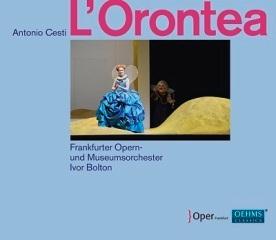Pietro Antonio Cesti - L’Orontea (2017)
Pietro Antonio Cesti - L’Orontea (2017)

Disc 1 1.Sinfonia (1. Akt) 2.Sciolta il crin 3.Superbo amore 4.E pur sempre fastosa di libertà 5.Hai provato, assassino 6.Non affrettar il passo 7.Ardo, lassa, o non ardo? 8.Chi non beve 9.Com'è dolce 10.Come dolce 11.Spuntò in ciel 12.Fu lieve la ferita 13.Vieni, resta, no, sì? 14.Qual nuova luce aggirasi 15.Donzelletta vezzosetta 16.Ferma là, ferma là 17.Pur ti ritrovo alfine 18. In grembo ai fiori lieto mi sto Disc 2 1.Preludio (2. Akt) 2.S'io non vedo Alidoro 3.Signora, un forestiero audienza chiede 4.Eccomi a piedi tuoi 5.Che farai, troppo altera? 6.Così arrogante sei? 7.Se Amor insolente 8.Dove, dove infelice me 9.Addio, Corindo 10.Vengo, cor mio 11.O cielo, a che son giunto 12.Fortunati colori dalla terra prodotti 13.Eccomi, vita mia 14.E che vorresti 15.Qual fulmine tonante 16.Il sole ancor non spunta 17.E che si fa? 18.Intorno all' idol mio 19.Qual profondo letargo Disc 3 1.Rigorosa Orontea (3. Akt) 2.A me? - A te, mio bene 3.La corte è sotto sopra 4.A così infausto segno ti guidò 5.De' tuoi doni arricchito 6.Silandra, anima cara 7.Dal pittore schernita 8.Che novelle, Gelone? 9.Flemma, pian, piano 10.Mie pene, che fate? 11.Nel real gabinetto 12.Giàcche femmina sei 13.Il mio ben dice ch'io speri 14.La genitrice mia 15.In che t'offese? 16.Ah, pur troppo son qui 17.Innocente, mio tesoro Filosofia - Katharina Magiera (alto), Amore/Tibrino - Juanita Lascarro (soprano), Orontea - Paula Murrihy (mezzo-soprano), Creonte - Sebastian Geyer (baritone), Aristea - Guy de Mey (tenor), Alidoro - Xavier Sabata (countertenor), Gelone - Simon Bailey (bass), Corindo - Matthias Rexroth (countertenor), Silandra - Louise Alder (soprano), Giacinta - Kateryna Kasper (soprano). Frankfurt Opera and Museum Orchestra, Monteverdi Continuo Ensemble, Сonductor - Ivor Bolton. Recorded live of the premiere series Oper Frankfurt, February-Mach 2015.
The premiere von L'Orontea took place in 1656 in Innsbruck at the court of Archduke Ferdinand Karl, grandson of Duke Ferdinand of Tuscany, who at that time was the patron of the first attempts of the art form of opera in Florence. Alongside Francesco Cavalli's opera "La Giasone", "L'Orontea" went down in history as the most successful opera of the late 17th century. On the occasion of the premiere in Frankfurt, the following could be read in Deutschlandradio Kultur: "It is a scenic production that will remain in one's memory - not because the production in Frankfurt is so shameless and trashy. Instead, it reminds us of why Antonio Cesti's opera "L'Orontea" once belonged to the most beloved of all stage works. And it is well worth taking a look into the orchestra pit at this performance." --- arkivmusic.com
All the confusion starts from a strong statement: the Egyptian queen Orontea has proclaimed that she will never fall in love. Clearly, that was never going to work, the proof of which is played out over three and half hours of madcap action riddled with erotic games: Venetian Carnival opera was never a child full of woe. Similarly comic love entanglements were not to be found until Mozart’s Marriage of Figaro, the devices of which can already be seen in L’Orontea: false identities, cunningly crafted letters and babies stolen at birth, the same method of proof of princely birth by means of an amulet. In the course of the action, just about everyone loves someone else, but after many turbulent struggles, everything comes right in the happy (of course) ending, and Love and Philosophy come out of the dispute in the Prologue as the happy winners. ---bachtrack.com
download (mp3 @320 kbs):








